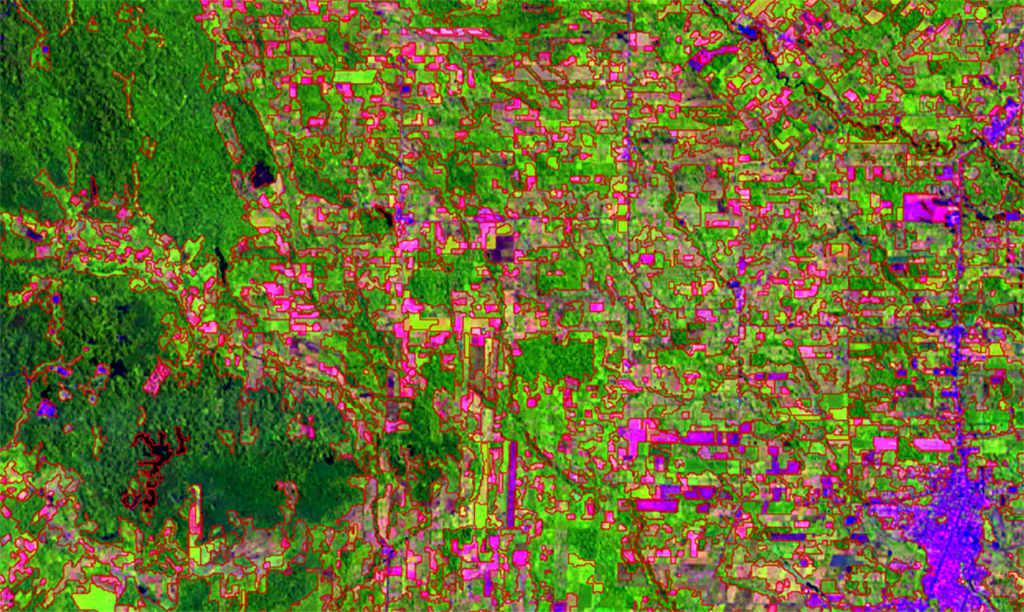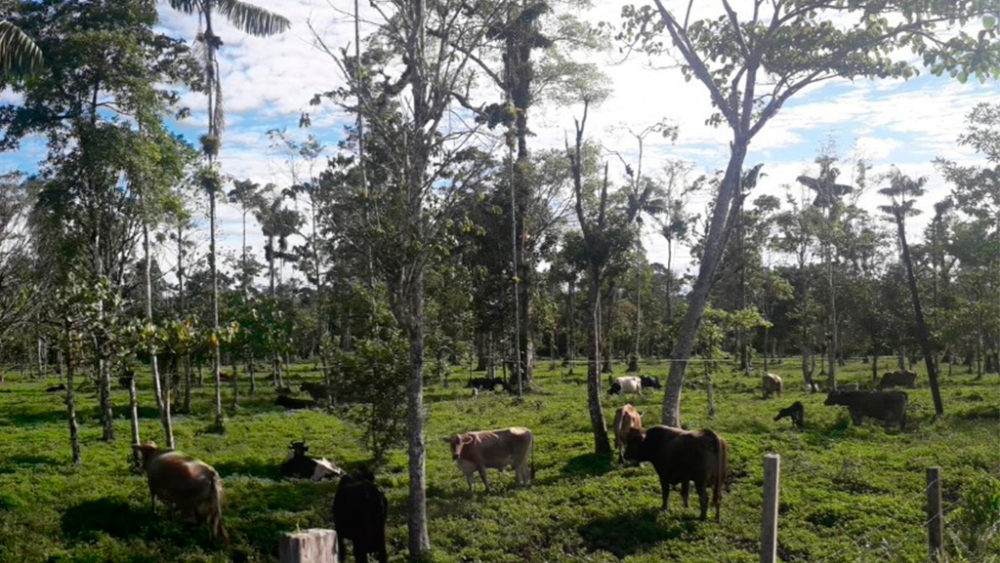In early 2020, the UNDP Sustainable Development Goals Accelerator Labs Network, together with the GIZ Data Lab (Deutsche Gesselschaft für Internationale Zusammenarbeit) with University of Manchester technical support, launched a study to explore the potential of Data Powered Positive Deviance (DPPD) for sustainable development.
UNDP Accelerator Labs and GIZ projects in Ecuador, Mexico, Niger and Somalia/Somaliland are using administrative records, satellite imagery, and urban, social media and mobility data to identify positive deviances in various contexts, such as the advance of the agricultural frontier in the Amazon forest, public spaces in Mexico City and pastoralist villages in Somaliland. Our goal is to identify well-developed, adapted local solutions that can help communities overcome the development challenges they face.
A “Positive” case study
The Positive Deviance approach assumes that, in each community, there are individuals or groups whose unique behaviors or resilience mechanisms allow them, unlike their peers, to find better solutions to problems with the same resources. The goal of Positive Deviance interventions is to identify attributes or traits of individuals and groups in order to understand what differentiates them from others. These traits will serve as a reference for other members of the community so that they can address common problems with accessible resources. In short, it does not seek negative experiences in order to correct them; rather, positive deviances from the status quo are identified to try to replicate them collectively in situ. Perhaps the best-known experience with Positive Deviance was a ‘Save the Children’ initiative in northern Vietnam in the 1990s. At the time, 65% of children between the ages of 1 and 4 in Vietnamese villages were malnourished. ‘Save the Children’ had a clear purpose: to find a sustainable and large-scale solution, based on local resources, that would show results in six months.
NGO staff in the territory set out to find families where children did not show signs of malnutrition. The team identified several of these “positive deviances” and discovered that caregivers added shrimp, crab and fish to the household diet, even though these foods were considered inappropriate for young children. With this idea, Save the Children developed activities with local communities to rehabilitate hundreds of malnourished children, and teach families how to feed their children at home, on their own.

Since the 1990s, Positive Deviance approaches have been applied to other developmental problems, such as school year losses, neonatal mortality, pregnancy termination, violence against women, health services, HIV transmission, and antibiotic-resistant bacteria infections in hospitals.
Big Data, Positive Deviance, and Development.
Traditional positive deviance initiatives rely heavily on primary and secondary data sources, e.g. data collected directly from the study target group, and reused data (such as censuses), respectively. Unfortunately, these data are very expensive (primary sources) and concentrated in aggregate variables or in variables that are irrelevant for positive atypical behaviors (secondary sources). They can also be limited in time (a momentary photo rather than information that evolves over time).
Recent work by GIZ Labs, the UN Global Pulse Lab Jakarta, and the University of Manchester, show that it is possible to utilize big data, for example, high quantity, speed and variety of data generated mainly by individuals, as we carry out daily activities, to discover positive deviances in agricultural communities, and isolate factors that differentiate them from their peers.
Inspired by this, the UNDP Accelerator Labs and GIZ Data Lab with the technical support of the University of Manchester, launched a series of pilot programs in early 2020 in the Data Powered Positive Deviance – DPPD initiative, which called for proposals from interested laboratories.

The Data Powered Positive Deviance Initiative has several pilot programs in a few countries to understand how big data can contribute to development challenges © GIZ Data Lab
17 Accelerator Labs and 2 GIZ projects responded with 23 proposals. Four were selected from Ecuador, Mexico, Niger and Somaliland, and are based on an aligned work between Accelerator labs and GIZ portfolios at the local level, and their potential to use of big data to identify positive deviances in the challenges of deforestation, violence against women, sustainable agriculture and water management.
This is what we are working on:
Ecuador: Mitigating Deforestation Through Sustainable Livestock
-

Satellite image of land use and coverage in Joya de los Sachas – Ecuador (2020)
© UNDP Ecuador -

Right: satellite image of Joya de los Sachas – Ecuador (2020); Left: classification of land use and cover Joya de los Sachas – Ecuador (2020)
© UNDP Ecuador
Context: In 2017, the Ministry of Environment and Water and the Ministry of Agriculture supported by UNDP, launched an ambitious 5-year program, PROAmazonía, which aims to transform the agricultural and forestry sectors of the Ecuadorian Amazon region. One of its goals is to reduce CO2 emissions by mitigating deforestation and promoting sustainable land use without cutting down trees in the forest for local agriculture. The GIZ Ecuador Positive Deviance team is working with the Ministry of Environment and Water to implement its national bioeconomy strategy for the protection and sustainable use of biodiversity through the social, economic and ecological development of sustainable solutions.
Positive Inflections: The expansion of the agricultural frontier is one of the main causes of deforestation in the Ecuadorian Amazon; 99% of deforested areas are transformed into agricultural fields and 64.99% are used as pastures.
The UNDP Accelerator Lab in Ecuador, and the GIZ Data Lab and its partners, are using satellite imagery to identify “outlier” ranchers who operate in areas where the agricultural frontier is expanding, without contributing further to deforestation.
Using additional climate, socio-economic, and ethnographic data sources, the team will investigate contextual factors and characteristics that contribute to these forest-conscious livestock practices.
Findings: In order to extrapolate the results to design future policies based on local evidence, two territorial analysis units were selected (Joya de los Sachas canton in the northeast and Sucúa canton in the south) since these regions have undergone different colonization and deforestation processes, and cadasters and satellite images are available in these territories. The most complex part of the land use and cover analysis was differentiating between pastures with livestock and other types. We hope to use information from Agrocalidad vaccination records or satellite images of methane emissions from livestock during eating and digesting to overcome this challenge.
Mexico: Addressing violence against women in public spaces
Context: In November 2019, the mayor of Mexico City issued a gender violence alert and implemented a series of measures to reduce violence against women. The measures for public spaces included the renewal public corridors and placing alarm buttons and other sensory devices on city streets to encourage women and bystanders to report incidents.
Positive Deviance: UNDP labs in Mexico, together with their counterparts, are using the data collected by these devices to identify positive deviances in public spaces, for example, public transport, parks and corridors where women are safe. Using additional data sources, such as the analysis of social network perceptions, socioeconomic censuses, perception of public safety and urban infrastructure, the team will investigate contextual factors and characteristics that contribute to reducing rates of aggression against women in these spaces.
Niger: Ensuring Food Security Through Agriculture
Context: Sustainable agriculture in Niger is under tremendous pressure. On the one hand, the growing prolonged occupation of crop land is a direct source of inter-community conflict. For example, deadly confrontations have been reported between farmers and community herders in the Tahoua and Maradi regions. On the other hand, climate change and reduced rainfall seriously affect agricultural cycles, such as sorghum (a type of corn), which has an average cycle of six months. Crops that mature in a drier environment are of lower quality, which in turn worsens food insecurity.
Positive Deviances: The UNDP Lab in Niger and its partners will use remote sensing data to identify positive deviances in agricultural communities that are able to accelerate their agricultural cycles, for example, using soaking techniques to shorten land occupation and improve the quality of their crops. Using additional data sources, the team will then investigate contextual factors and characteristics that contribute to the ability of these communities to accelerate their practices and mitigate conflict.
Somalia/Somaliland: Supporting pastoralist communities amid environmental challenges.

Context: Between 2010 and 2012, and again in 2017, repeated confrontations in Somalia caused more than a quarter of a million deaths, and contributed to the displacement of about 4.2 million people. The country is still recovering from these events and many internally displaced people, who are part of nomadic pastoralist communities, continue to gather around major urban areas.
Positive Deviances: Herders constitute about 55% of Somaliland’s population, and are an essential part of the economic soul of the region. However, these communities are extremely vulnerable to environmental degradation and changes in the water supply, and therefore are highly prone to internal displacement. The UNDP Somalia Accelerator Lab and its collaborators will use remote sensing and mobility data to identify positive deviances in pastoralist communities that continue to flourish despite climate problems, thus avoiding the congestion of internal migration settlements. Using additional sources of official data from national and international organizations, the group will continue to investigate contextual factors and characteristics that contribute to the ability of these communities to maintain their lifestyle.
Insights: A challenge we face in our work with positive deviances involves the acquisition of large-scale data over a wide geographic area. We also explore multiple data sources to gain a better understanding of the current landscape. For example, we use vaccination data as an indicator of changes in herd size, before, during and after droughts. We also talk to our local telecommunications provider, include CDR data and consider changes in location and movement of the sample in our study area.
Next Steps: UNDP Accelerator Labs began to implement its pilot programs and carry out preliminary analyzes to strengthen the implementation of its experiments. The lessons, challenges, insights and feedback will be shared among the network of Accelerator Labs and with other stakeholders. In the long term, these four projects aim to inform specific interventions to help communities meet challenges, and use their neighbors as mentors and examples. However, for now, the goal of the DPPD initiative is to identify what characterizes positive deviances in different contexts with respect to the challenges people face, and how big data can contribute to these efforts.
Authors:
- Jeremy Boy, Data Analysis Scientist, UNDP Accelerator Lab.
- Andreas Gluecker, Project Director, GIZ Data Lab.
In collaboration with:
- Ana Grijalva, Head of Exploration, UNDP Ecuador Accelerator Lab
- Hodan Abdullahi, Head of Exploration, UNDP Somaliland Accelerator Lab
- Gabriela Ríos, Head of Exploration, UNDP Mexico Accelerator Lab
- Moustapha Sahirou, Head of Exploration, UNDP Niger Accelerator Lab
 Español
Español English
English


